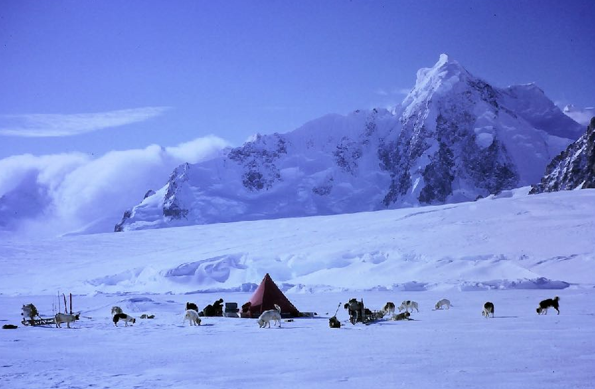An Epilogue to Fids, Part II – Dog Holden
In 2020, early in the life of the Marguerite Bay website, with Covid-19 lockdowns taking hold in several countries, Steve Wormald, the website’s creator, found that he was getting little interest and few if any contributions from 21st Century MB Fids, i.e., those who had wintered at Rothera from about 2000 onwards. Steve wondered about this apparent lack of interest from the recent Fids in telling their stories, not to mention them learning about some of the history of MB life from those that had been there in earlier times. Although on the face of it there was nothing special about the turn of the Millennium, perhaps it did bring with it a shift away from what had gone before? It is interesting to think that 1966/67 (a time well-represented by MB Website stories) sits halfway in the 110 years since Captain Scott’s Last Expedition to the present day. No wonder things had changed!
Continuing From Archives Page….
In February 2005, I returned to Rothera with about 100 ex-Fids and partners on a “cruise” ship. I was amazed by the changes that had occurred in the 30+ years that had elapsed since I had helped build Phases 1 and 2 of the Base. I’d assumed that the place would be bigger and busier with more whizzy technology and “mod cons”, not to mention the hard runway. I still thought though that Fid-life would be pretty similar to what I/we had experienced. There was indeed the expected leap in scale, given Rothera’s role as the major field base for BAS and other international operations, but the changes in approach and practices took me by surprise. At the time of our visit, the Summer Operations Manager (this may not be the precise job title), had just returned from a mid-season 2 weeks holiday in Spain. Obviously the hard-runway and regular air link with Chile made this possible but the fact that it was considered necessary or desirable to take such a break was a stunner for us.
Most of us visitors had also not appreciated that there was little, if any, sharing of the menial or communal tasks such as cooking, gash, cargo-shifting, drum-rolling, building etc. that were so much a part of our lives and contributed enormously to the team-spirit and shared experience, not to mention the social-levelling that went with such a life. Everyone now seemed to do only the job they had been hired for – contractors did most if not all the manual and trades work, not just the building mega-projects. (Nick Beer touched upon this in his piece reproduced in this website: “An Epilogue to Fids”.) Learning this, perhaps I should not have been surprised by the sight of a Fid on an exercise bike in a gym, in a busy summer season at Rothera. One thought of the exercise we used to all get just running a base.
The 21st Century general approach to life with less emphasis on initiative and cautious approach to risk, has also utterly changed things for Fids. There was a piece written recently by a wintering Rothera Fid who described the lengthy preparations, complex risk assessment and finally the achievement of a brief excursion from base onto the sea-ice on skis. This was clearly an exceptional and much-anticipated expedition! This is not a personal criticism of the Fid in question, but as an example of how the whole approach and system has changed.
In the U.K., in general, there is much less interest than there used to be in history and tradition. It seems to smack too much of past wrongdoings, actual or perceived, and from a Fid point of view, the old practices, and attitudes (of killing seals and/or penguins, for dog or human food, throwing gash etc. in the sea, not to mention our all-male base environment), do not sit well with the modern way of thinking.
UKRI/NERC/BAS are understandably focused on science and the maintenance of political and hence financial standing and influence. What we did and how we did it in the late 20th Century counts for little if anything in securing funding for climate-change research or other major projects in present-day Antarctica. An illustration of this focus is the tale of the husky statue. For a few years, there was a roughly life-sized statue of a husky, and a plaque with the names of the old FID/BAS dog-teams on it just outside the entrance of BAS HQ., Cambridge. Ex-Halley Bay Fids, Hwfa Jones and the late “Genghis” Wright raised the funds from Fids to commission this. BAS “hosted” it and BAS Club maintained, insured, and cleaned it. It seemed to be liked by visitors and formed an appropriate introduction to the building. When the entrance and reception had a major refurbishment and expansion a few years ago, it was decided that there was no room for the statue in the large new atrium/reception area. So, this symbol of the great history of Fid exploration and travel is now at SPRI! It seems a shame that the statue could not “greet” visitors to BAS as part of a simple history/legacy walk-through display. So much for the past!
Nevertheless, whilst understanding that times must change, I often think that the title of Evelyn Waugh’s book on travel in Abyssinia before WWII, “When the Going Was Good”, sums up how lucky and privileged we were to be Fids in the later part of the 20th Century.
Dog Holden, Bases E, T, R & Belgrano, 1973-78
